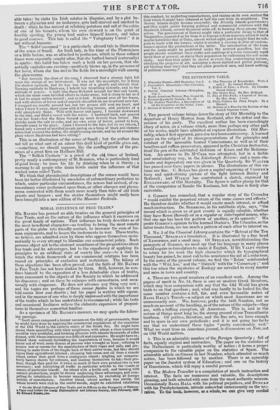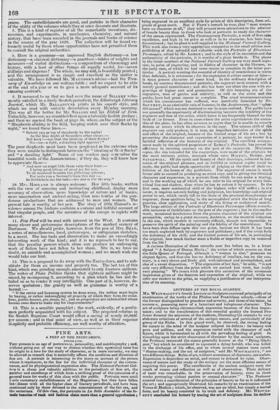THE REVIEWER'S TABLE.
2. Constable's Miscellany—The Crusades, Vol. 2. 3. Family Classical Library—Xenophon, Doyne Sillery. Vol. 1.10. The Stolen Boy. By Mrs. Hofiand.
5. Foreign Quarterly Review, No, 10. By Mrs. Bray. ZI vols. 1, Waverley Novels—Old Mortality, Vol.2. S. The Treasury of Knowledge. Parts 1 and 2. By Samuel Maunder. 9. Eldrid of Erin ; a Puem. By Charles 6. The Modern Traveller; a Description of 12. Plain Politics for Plain People. By a all the Countries of the Globe. 2 vols.
1. THE present volume brings down the story of Old Mortality to the departure of Henry Morton from Scotland, after the defeat and dis- persion of his party. The excellent author has been exceedingly chary of notes, on a volume which, more than perhaps any other part of his works, might have admitted of copious illustration. Old Mor- tality, when it first appeared, gave rise to a keen controversy. A learned paper on the subject of its misrepresentations of the principles and conduct of the miserable hunted Cameronians, as well as of their heartless and ruffian persecutors, appeared in the Christian Instructor, frord the pen of the celebrated historian of KNox and the Reforma- tion. An answer to Dr. M'CRIE was attempted, but in a feeble and unsatisfactory way, in the Edinburgh Review; and a more ela- borate and deprecatory one was given in the Quarterly. Sir WALTER has passed over these papers in silence. The illustrations of this vo- lume are fine. C. ROLLS has given a capital engraving of COOPER'S busy and spirit-stirring picture of the fight between Burley and Bothwell ; and WILKIE has contributed a sketch, engraved by ENGLEHEART, of Old Mortality. The figure is rather plump for that of the compotator of Sandie the Keelman, but the face is finely char. racteristic.
2. GIBBON has remarked, that a regular story of the Crusades "would exhibit the perpetual return of the same causes and effects." He therefore doubts whether it would excite much interest, or afford much instruction. Dr. STEBBING, in his antithetic style, says, "the record which is given us of past events is equally valuable, whether they have flown (flowed) on in a regular or interrupted course, whe- ther one age has been the pattern of another, or its opposite." We prefer GIBBON'S opinion to the learned Doctor's. The Crusades, as the lattertreats them, are too much a pattern of each other to interest us.
3. No. 3 of the Classical Library contains the "Retreat of the Ten Thousand," SPELMANS translation. It is illustrated by a fine head of XENOPHON, and a small map. Of SPELMAN, notwithstanding the panegyric of GIBBON, we must say that his language in many places would require re-translation to make it English. If Mr. VALPY wishes to retain for his work the high character which its typographical beauty has gained, he must call to his assistance the aid of a redacteur. In the notes of the present volume, we find the "Zebra" confounded with the "Wild Ass," and the "Ostrich" with the " Cassomry ;" and this too when the mysteries of Zoology are unveiled to every master and miss in town and country.
4. These are two good numbers of an excellent work. Among the papers of merit in No. 55, there is one on modern Greek literature, which may bear comparison with any that the Old World has given birth to on that question ; and, what was hardly to be looked for, the same number contains a full, fair, and even favourable notice of BASIL HALL'S Travels—a subject on which most Americans are so unnecessarily sore. We, however, prefer the 56th Number, not so much on accoimt of the handling, as of the nature of the subjects—they are, with a trifling exception, all American. This is, and in the nature of things must long be, the strong ground of our Transatlantic brethren. Of politics, literature, and the fine arts, we have enough and to spare in our own periodicals ; and it is not going too far to say that we understand these topics "pretty considerably well." What we want from an American journal, is discussions on New, not on Old World matters.
5. This is an admirable number of the Foreign Quarterly ; full of facts, equally original and instructive. The paper on the statistics of the Netherlands is particularly worthy of notice ; it forms a proper companion to the valuable paper on the statistics of Spain. The admirable article on Greece in last Number, which attracted so much notice, has been followed up by another. There is an agreeabte paper on the Jacotot system of Education ; and one on the history of Gnosticism, which will repay a careful perusal.
6. The Modern Traveller is a compilation of much instruction and interest. The facts are numerous and valuable, the descriptions pleasing, and both selected with care from the most authentic source, Occasionally BASIL HALL with his political prejudices, and DUNCAN with his Presbyterianism, intrude somewhat unnecessarily on the na.2- rative. To the book, however, as a whole, we can give very cordial
praise. The embellishments are good, and partake in their character of the utility of the volumes which they at once decorate and illustrate.
7. This is a kind of register of all the remarkable inventions, dis- coveries, and experiments, in mechanics, chemistry, and natural nistory, that have been recorded in the journals and books of science in the course of the year 1829. The collection will be found ex- tremely useful by those whose opportunities have not permitted them to consult the original authorities.
8. Here is a grammar—an improved English dictionary—a law dictionary—a classical dictionary—a gazetteer—tables of weights and measures—of verbal distinctions—a compendium of chronology and history, with a host of other things all equally useful, for—seven shillings and sixpence ! The whole, we may add, is beautifully printed ; and the arran„mement is as simple and excellent as the matter is valuable. We have followed Mr. MAUNDERS advice—laid the Trea- sury of Knowledge on our writing-table ; and we expect to be able at the end of a year or so to give a more adequate account of its amazing contents.
9. It occurred to us that we had seen the name of SILLERY vehe- mently extolled in a lively Scotch periodical, the Edinburgh Literary Journal, which Mr. BALLANTYNE prints in his superb style, and which we read with suitable delectation every Monday morning. This was all the better for Mr. SILLERY and his Eldrid of Erin. Unluckily, however, we stumbled first upon a tolerably foolish preface ; and then we opened the book at page 30, where, on the subject of the "Shepherds abiding in the field, keeping watch over their flocks by night," we found these lines,—
" Behold yon grpup of shepherds by the rocks ! As the blue depth of boundless ether clears :— But hark !—was that the bleating of their flocks?
No—no--a light, a dazzling light appears !"
The poor shepherds must have been perplexed in the extreme when they were unable to distinguish between the "bleating of th.3ir flocks" and "a dazzling light:' Some of our readers may ronember the beautiful words of the Annunciation ; if they do, they will know how to appreciate these-
" And now an angel bids them calm their fears • I bring good tidings of great joy for aye,
• To all mankind beneath the glittering spheres ; For unto you a Saviour's born this day :- k Bethlehem lies the babe—his star is o'er the way."
10. Mrs. HOFLAND is always welcome. Her little books, written with the view of amusing and instructing childhood, display more accuracy of observation, more knowledge of nature and of books, more imagination and understanding, than nine tenths of the pon- derous, productions that are addressed to men and women. The present tale is worthy of her pen. The story of little Manners re- sidence among the Indians contains a curious and faithful account of that singular people, and the narrative of his escape is replete with interest.
11. Fitz Ford will be read with interest in the West. It contains. many clever and picturesque descriptions of the marked scenery of Dartmoor. We should prefer, however, from the pen of Mrs. BRAY, IL series of miscellaneous, local, picturesque, or antiquarian sketches, to a novel. She has taste and observation to make an exceedingly interesting work of this kind ; and it is no reproach to her to say, that the peculiar powers which alone can produce an undecaying work of fiction have not fallen to her share. She is, we have no doubt, an amiable and accomplished woman ; and we much wish she would take our hint.
. 12. This is a proposal to do away with the Excise-laws, and to sub- stitute for them an income and property tax. The last tax of this kind, which was grinding enough, amounted to only fourteen millions. The writer of Plain Polities thinks that eighteen millions might be raised, by re-imposing it, according to a plan which he has not de- tailed so as to render it very intelligible. One part of it, however, de- serves quotation ; the gravity as well as grammar is worthy of a hermit :—
"If the excise and licensing system be done away, the nation must begin by buying, or rather indemnifying all property of which they form the value. Inns, public-houses, gin-shops, &c., just as proprietors are indemnified whose houses came down to make way for improvements."
13. This is a sensible pamphlet ; the work, evidently, of a gentle- man perfectly acquainted with his subject. The proposed reforms in the Scotch Supreme Court would effect a saving of nearly 40,0001. per annum ; and in that point of view, as well as in their superior simplicity and probable efficiency, are well worthy of attention.



















 Previous page
Previous page